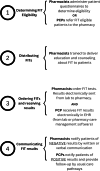Primary care provider perspectives on the role of community pharmacy in colorectal cancer screening: a qualitative study
- PMID: 37612656
- PMCID: PMC10463525
- DOI: 10.1186/s12913-023-09828-3
Primary care provider perspectives on the role of community pharmacy in colorectal cancer screening: a qualitative study
Abstract
Background: The United States Preventive Services Task Force (USPSTF) lists 32 grade A or B recommended preventive services for non-pregnant United States (US) adults, including colorectal cancer screening (CRC). Little guidance is given on how to implement these services with consistency and fidelity in primary care. Given limited patient visit time and competing demands, primary care providers (PCPs) tend to prioritize a small subset of these recommendations. Completion rates of some of these services, including CRC screening, are suboptimal. Expanding delivery of preventive services to other healthcare providers, where possible, can improve access and uptake, particularly in medically underserved areas or populations. Fecal immunochemical testing (FIT) (at-home, stool-based testing) for CRC screening can be distributed and resulted without PCP involvement. Pharmacists have long delivered preventive services (e.g., influenza vaccination) and may be a good option for expanding CRC screening delivery using FIT, but it is not clear how PCPs would perceive this expansion.
Methods: We used semi-structured interviews with PCPs in North Carolina and Washington state to assess perceptions and recommendations for a potential pharmacy-based FIT distribution program (PharmFIT™). Transcripts were coded and analyzed using a hybrid inductive-deductive content analysis guided by the Consolidated Framework for Implementation Research (CFIR) to elucidate potential multi-level facilitators of and barriers to implementation of PharmFIT™.
Results: We completed 30 interviews with PCPs in North Carolina (N = 12) and Washington state (N = 18). PCPs in both states were largely accepting of PharmFIT™, with several important considerations. First, PCPs felt that pharmacists should receive appropriate training for identifying patients eligible and due for FIT screening. Second, a clear understanding of responsibility for tracking tests, communication, and, particularly, follow-up of positive test results should be established and followed. Finally, clear electronic workflows should be established for relay of test result information between the pharmacy and the primary care clinic.
Conclusion: If the conditions are met regarding pharmacist training, follow-up for positive FITs, and transfer of documentation, PCPs are likely to support PharmFIT™ as a way for their patients to obtain and complete CRC screening using FIT.
Keywords: Colorectal Cancer screening; Fecal immunochemical test; Pharmacist; Pharmacy.
© 2023. BioMed Central Ltd., part of Springer Nature.
Conflict of interest statement
The authors declare that they have no competing interests.
Figures
References
-
- A. and B Recommendations | United States Preventive Services Taskforce [Internet]. [cited 2022 Aug 17]. Available from: https://www.uspreventiveservicestaskforce.org/uspstf/recommendation-topi....
MeSH terms
Grants and funding
LinkOut - more resources
Full Text Sources
Medical
Miscellaneous


